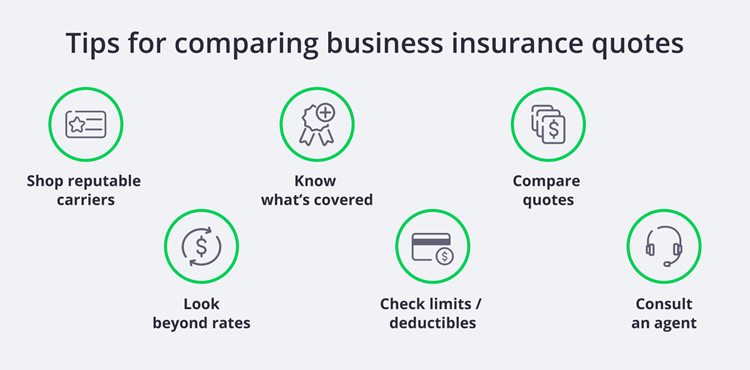
These 8 steps can help you compare business insurance quotes and find the right coverage for your business.
Finding the right small business insurance is more than looking at how much you’ll pay in premiums.
You should consider many factors, such as your biggest business risks, policy exclusions, and coverage limits. These 8 tips can help you find and compare the best policies to fit your business’s budget.
1. Start With Reputable Insurance Carriers
Make sure you request quotes from dependable insurance carriers. You don’t want to buy an insurance policy at a bargain, only to learn that your insurance company can’t pay a claim. There are several independent rating agencies that measure the financial strength of insurers. Avoid any insurance companies that aren’t making the grade.
2. Consider More Than Just Insurance Rates
For small business owners with tight budgets, it can be tempting to make a purchasing decision based only on premiums instead of being focused on the best protection.
Prior to making a decision based on price, keep in mind that you’re paying for business insurance policies that reduce the risk of a financial loss. If a policy price is less than the competition’s, there’s probably a reason why it’s priced that way.
Does it leave out the coverage you may want later on? Are the limits high enough to comply with client contracts? Search beyond dollar signs and read into the finer details that distinguish one policy from another.
There are multiple ways to lower small business insurance costs without sacrificing the protection you need. Consider options like:
- Purchasing a business owner’s policy (BOP), which bundles general liability insurance with commercial property insurance – usually at a savings.
- Raising your deductibles and lowering policy limits can also help trim costs.
- Paying your policy premiums annually instead of monthly.
3. Understand What’s Covered – And What’s Not
Business insurance coverage varies from policy to policy and insurer to insurer. Review each policy and coverage option carefully, so you understand what you’re getting.
Every insurance policy will detail its inclusions and exclusions, or the events that will and won’t be covered. Pay attention to these items because they determine the terms of your coverage.
For example, when reviewing commercial auto quotes, you’ll want to understand the level of coverage each policy offers for bodily injuries, property damage liability, collision coverage, uninsured motorist coverage, and personal injury protection.
With any type of policy you’re reviewing, never assume that the coverage provided in every quote is the same. You don’t want to purchase a policy, only to find out when it’s time to file a claim that it doesn’t have the protection you need.
4. Check Policy Limits And Deductibles
Policy limits are the maximum amount that your insurance provider will pay or claim under a policy. You’ll want to choose the limits that can shield you from damaging claims over liability lawsuits or other losses.
There are two types of limits: per-occurrence and aggregate:
- Per-occurrence limit: The highest amount your policy will pay for any single claim.
- Aggregate limit: The total your policy will pay for all the claims in a single policy period (usually a year).
Often, your client contracts, property lease, or mortgage agreement will have you carry liability coverage like a general liability insurance policy or a professional liability insurance policy. If they do, you’re probably required to carry a minimum level of coverage. Make sure that the policies you buy meet the requirements of any contracts you have.
Your deductible is the amount you pay out of pocket before your insurance benefits begin on a claim. Usually, the higher the deductible, the lower your premium.
When reviewing your options, don’t pick a deductible amount that’s more than you can afford to pay if you need to file a claim.
For example, say you purchased a cyber liability insurance policy with a $1,000 deductible. If you suffer a data breach but don’t have that money on hand, then your benefits won’t work. Remember, your insurance policy won’t do you any good if you can’t raise the cash to cover the deductible.

5. Pick A Policy That Can Grow With Your Business
When you compare small business insurance quotes, consider how quickly your business might grow in a year. When reviewing limits, inclusions, and exclusions, you’ll want to leave some room to ensure your insurance continues to meet your needs – even if you experience an increase in business.
6. Compare Quotes With Your Current Insurance Coverage
When comparing quotes for differing types of insurance, look at your own policy (if you have one), first. Think about what you like and dislike about your existing policy. What’s missing? Do these new policies fill coverage gaps? Your current insurance policy can be a useful measuring stick to determine whether you’re getting the right coverage for a fair price. Compare quotes and protect your small business with Ovation!
7. Consider How Soon You’ll Need Coverage
Where you decide to buy your insurance impacts when you’ll recieve your coverage. You may need to secure coverage very soon to sign a lease or land a big client contract. If you require coverage right away, confirm with your agent or your carrier that there will be no delay in purchasing the quoted policies.
Hit the ground running. When you start a quote with Ovation, you can quickly compare quotes from top carriers and get a certificate of insurance the same day!
8. Ask Your Agent For Guidance
One of the biggest perks of working with an agent is that they can help you identify your most significant insurance needs, make sound decisions, and guide you through the comparison process.
Any quotes you receive online aren’t final, as they’re based on the information you include in your application. If you misunderstood a question or made a mistake when entering information, your quote may change as the agent helps you refine your answers.
Turn to your insurance agent when you need help with:
- Deciphering industry jargon. Not sure what a particular coverage does or what a word in your policy means? Your agent can explain the complexities of insurance in plain English.
- Assessing your needs. Ovation agents specialize in varied industries and are licensed in several states. That gives us firsthand knowledge about the risks your business could face.
- Making a decision. Your insurance agent can point out the differences among various plans, which can help you make a confident and informed decision.
If you have more questions about comparing business insurance quotes, chat with an Ovation agent today.
